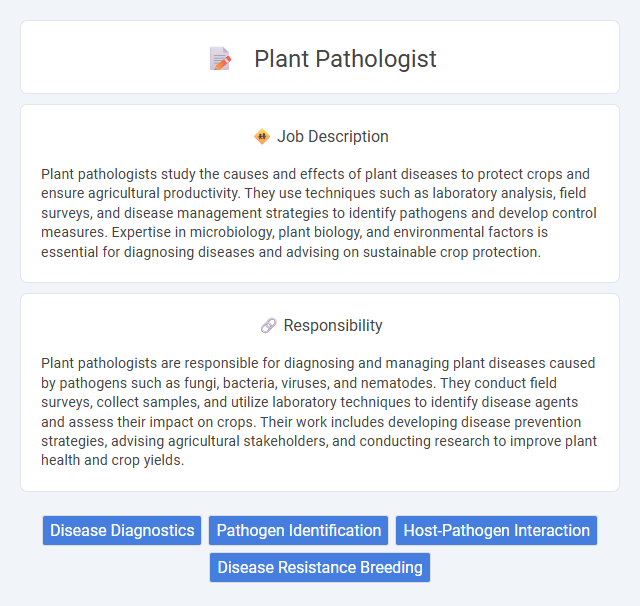
Plant pathologists study the causes and effects of plant diseases to protect crops and ensure agricultural productivity. They use techniques such as laboratory analysis, field surveys, and disease management strategies to identify pathogens and develop control measures. Expertise in microbiology, plant biology, and environmental factors is essential for diagnosing diseases and advising on sustainable crop protection.
Individuals with a strong interest in biology and problem-solving skills are likely to find a career as a plant pathologist suitable. Those who enjoy working both in laboratories and outdoor environments may be better adapted to the varied conditions of this role. People comfortable with research, data analysis, and attention to detail will probably thrive in understanding plant diseases and developing effective solutions.
Qualification
Plant pathologists typically hold a bachelor's degree in plant science, biology, or agriculture, with many positions requiring a master's or doctoral degree in plant pathology or a related field. Strong knowledge of microbiology, genetics, and plant physiology is essential, along with experience in laboratory research and fieldwork to diagnose and manage plant diseases. Proficiency in data analysis, molecular techniques, and familiarity with agricultural practices enhances job qualifications and career prospects.
Responsibility
Plant pathologists are responsible for diagnosing and managing plant diseases caused by pathogens such as fungi, bacteria, viruses, and nematodes. They conduct field surveys, collect samples, and utilize laboratory techniques to identify disease agents and assess their impact on crops. Their work includes developing disease prevention strategies, advising agricultural stakeholders, and conducting research to improve plant health and crop yields.
Benefit
Plant pathologists likely enjoy the benefit of contributing to agricultural sustainability by identifying and controlling plant diseases, which helps improve crop yields and food security. They probably experience professional satisfaction from conducting research that informs disease management strategies and supports environmental health. Job benefits may also include opportunities for fieldwork, collaboration with agricultural industries, and advancements in scientific knowledge.
Challenge
A plant pathologist likely faces the challenge of accurately diagnosing complex diseases caused by fungi, bacteria, viruses, and environmental factors, which can greatly impact crop yields. They may need to adapt quickly to emerging pathogens and evolving resistance patterns, requiring continuous research and innovation. Managing plant health in diverse ecosystems while balancing ecological and economic concerns could present ongoing difficulties in their work.
Career Advancement
Plant pathologists can advance their careers by specializing in areas such as molecular plant-microbe interactions, disease management, or agricultural biotechnology. Progression often involves obtaining advanced degrees like a Ph.D., gaining expertise in diagnostic techniques, and contributing to research publications. Leadership roles in agricultural research institutions, government agencies, or biotech companies become accessible with increased experience and demonstrated innovation in plant disease control.
Key Terms
Disease Diagnostics
Plant pathologists specializing in disease diagnostics utilize advanced molecular techniques and microscopy to identify pathogens affecting crops. They analyze plant samples for fungal, bacterial, viral, and nematode infections, enabling precise disease management strategies. Their expertise supports sustainable agriculture by preventing outbreaks and minimizing yield loss through early detection.
Pathogen Identification
Plant pathologists specialize in pathogen identification by analyzing symptoms and using molecular techniques such as PCR and DNA sequencing to detect fungal, bacterial, viral, and nematode pathogens. Accurate identification enables targeted treatment strategies and the development of resistant crop varieties, reducing agricultural losses. Expertise in pathogen diagnostics supports disease management programs critical for sustainable crop production and food security.
Host-Pathogen Interaction
Plant pathologists specializing in host-pathogen interactions study the complex relationships between plants and the microorganisms that cause diseases. They analyze molecular and genetic mechanisms to understand how pathogens infect host plants and how plants defend themselves. This research informs the development of resistant crop varieties and effective disease management strategies to enhance agricultural productivity.
Disease Resistance Breeding
Plant pathologists specializing in disease resistance breeding develop and test crop varieties to enhance resistance against pathogens such as fungi, bacteria, and viruses. They utilize genetic analysis, molecular markers, and field trials to identify traits that improve plant immunity and reduce yield losses. Their work supports sustainable agriculture by integrating resistant cultivars into breeding programs, mitigating the impact of plant diseases on global food security.
 kuljobs.com
kuljobs.com